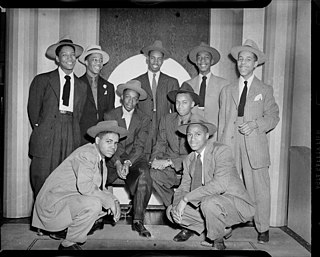
A zoot suit is a men's suit with high-waisted, wide-legged, tight-cuffed, pegged trousers, and a long coat with wide lapels and wide padded shoulders. It is most notable for its use as a cultural symbol among the Hepcat and Pachuco subcultures. Originating among African Americans it would later become popular with Mexican, Filipino, Italian, and Japanese Americans in the 1940s.

Pachucos are male members of a counterculture that emerged in El Paso, Texas, in the late 1930s. Pachucos are associated with zoot suit fashion, jump blues, jazz and swing music, a distinct dialect known as caló, and self-empowerment in rejecting assimilation into Anglo-American society. The pachuco counterculture flourished among Chicano boys and men in the 1940s as a symbol of rebellion, especially in Los Angeles. It spread to women who became known as pachucas and were perceived as unruly, masculine, and un-American.

Royal Crown Revue was a band formed in 1989 in Los Angeles, California. They have been credited with starting the swing revival movement.

Soul Caddy is the fourth studio album by American band the Cherry Poppin' Daddies, released on October 3, 2000 by Mojo Records.

The Cherry Poppin' Daddies are an American swing and ska band established in Eugene, Oregon, in 1989. Formed by singer-songwriter Steve Perry and bassist Dan Schmid, the band has experienced numerous personnel changes over the course of its 30-year history, with only Perry, Schmid and trumpeter Dana Heitman currently remaining from the original founding lineup.

Zoot Suit Riot: The Swingin' Hits of the Cherry Poppin' Daddies is a compilation album by the American band the Cherry Poppin' Daddies, released on March 18, 1997, by Space Age Bachelor Pad Records. The album is a collection of swing and jazz-influenced songs from the band's first three studio albums, along with four bonus tracks recorded especially for this compilation.
James Deuchar was a Scottish jazz trumpeter and big band arranger, born in Dundee, Scotland. He found fame as a performer and arranger in the 1950s and 1960s. Deuchar was taught trumpet by John Lynch, who learned bugle playing as a boy soldier in the First World War, and who later was Director of Brass Music for Dundee.
The swing revival, also called retro swing and neo-swing, was a renewed interest in swing music and Lindy Hop dance, beginning around 1989 and reaching a peak in the 1990s. The music was generally rooted in the big bands of the swing era of the 1930s and 1940s, but it was also greatly influenced by rockabilly, boogie-woogie, the jump blues of artists such as Louis Prima and Louis Jordan, and the theatrics of Cab Calloway. Many neo-swing bands practiced contemporary fusions of swing, jazz, and jump blues with rock, punk rock, ska, and ska punk music or had roots in punk, ska, ska punk, and alternative rock music.
"Fats" Sadi Pol Lallemand was a Belgian jazz musician, vocalist, and composer who played vibraphone and percussion. He chose the name "Sadi" because he disliked his last name, which means "the German" in French. He led a quartet and nonet and won the Belgian Golden Django for best French-speaking artist in 1996.

The Genius of Ray Charles is a 1959 Ray Charles album, released in October by Atlantic Records, the seventh album since the debut Ray Charles in 1957. The album consists of swinging pop with big band arrangements. It comprises a first half of big band songs and a second half of string-backed ballads. The Genius of Ray Charles sold fewer than 500,000 copies and charted at number 17 on the Billboard 200. "Let the Good Times Roll" and "Don't Let the Sun Catch You Cryin'" were released as singles in 1959.
Edward John “Ted”Templeman is an American musician and record producer. Among the acts he has a long relationship with are the rock bands Van Halen and the Doobie Brothers and the singer Van Morrison; he produced multiple critically acclaimed and commercially successful albums by each of them.

Donald Harrison Jr. is an African-American jazz saxophonist and the Big Chief of The Congo Square Nation Afro-New Orleans Cultural Group from New Orleans, Louisiana.

George Bruno "Zoot" Money was an English vocalist, keyboardist and bandleader. He was best known for playing the Hammond organ and for his leadership of the Big Roll Band. Inspired by Jerry Lee Lewis and Ray Charles, Money was drawn to rock and roll music and became involved in the music scenes of Bournemouth and Soho during the 1960s. He took his stage name "Zoot" from Zoot Sims after seeing him perform in concert.

"Zoot Suit Riot" is a song by the American ska-swing band the Cherry Poppin' Daddies, written by vocalist and frontman Steve Perry for the band's 1997 compilation album of the same name on Mojo Records.
Gene Roland (1921–1982) was a talented jazz musician, composer, and arranger who contributed richly to American jazz, especially through his work with the Stan Kenton Orchestra. Born in Dallas, Texas, he played multiple instruments, including the trumpet, trombone, and saxophone, and collaborated with icons like Count Basie and Dizzy Gillespie. Roland was pivotal in defining the unique "Four Brothers" sound that influenced big band jazz. Throughout his career, he contributed groundbreaking arrangements and compositions for many major bands, performing globally and even working with Denmark's Radiohus Orchestra.

The Amazing Crowns was a rock band that began in Providence, Rhode Island in 1993. The lineup of the Crowns consisted of vocalist Jason "King" Kendall, bassist Jack "the Swinger" Hanlon, guitarist J.D. Burgess, and drummer Judd Williams. The band's music has been described as "a hot & fast concotion of punked-up rockabilly".

Youth Brigade is an American hardcore punk band formed in Hollywood, Los Angeles, in 1980 by brothers Mark, Adam, and Shawn Stern. The band then founded BYO. Many later punk bands cite Youth Brigade as an influence, including The Nation of Ulysses and The Briefs.

Antti Juhani Sarpila is a Finnish jazz clarinetist.

Basie & Zoot is a studio album by the jazz pianist Count Basie and the saxophonist Zoot Sims, released in 1976 by Pablo Records. It was recorded on April 9, 1975, during a session organized by Norman Granz, the head of the label. Granz decided against using the Count Basie Orchestra, instead inviting Sims, who played with Basie a few years prior.

Down Home is an album by American jazz tenor saxophonist Zoot Sims.















